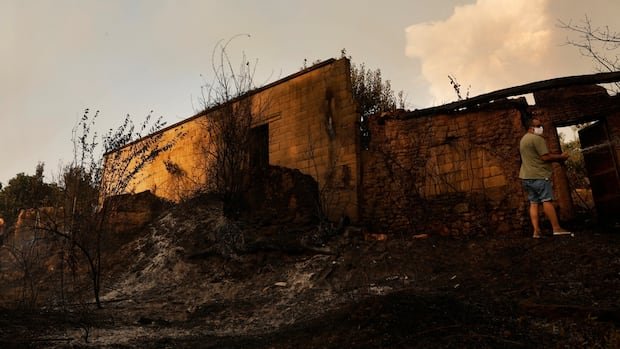Extreme heat and strong winds in northern Spain led to the formation of “fire whirls” as a wildfire destroyed multiple homes and prompted the evacuation of hundreds of individuals near a UNESCO-designated national park, authorities confirmed on Monday.
Approximately 800 residents were instructed to flee their residences in several villages across the Castile and Leon region, where numerous wildfires were raging uncontrollably. In the town of Congosta, locals were using garden hoses to dampen buildings, trees, and roads in an attempt to stave off the advancing flames, which had already consumed at least two structures. Despite police warnings to prepare for evacuation, the dense smoke hindered the deployment of firefighting aircraft.
Evangelina Peral Delgado, a 70-year-old resident of Congosta, expressed feelings of helplessness and abandonment as she witnessed several homes being engulfed by the inferno. High temperatures on the preceding day had caused the occurrence of fire whirls near Las Medulas park, compelling firefighters to retreat, as explained by Juan Carlos Suarez-Quinones, the region’s chief environmental officer.
Experts attribute the increased wildfire risk in the Mediterranean region to hotter and drier summers. Once ignited, dry vegetation coupled with strong winds can accelerate the spread of fires, leading to uncontrollable blazes and the formation of fire whirls. The ongoing heatwave in Spain persisted on Monday, with temperatures forecasted to soar as high as 42°C in specific areas.
Domingo Aparicio, a 77-year-old resident of Cubo de Benavente, shared his distress after being evacuated from his home due to a nearby warehouse fire. Suarez-Quinones suggested that while a few fires may have been initiated by lightning strikes, the majority appeared to be deliberate acts of arson, which he condemned as “environmental terrorism.”
In Portugal, nearly 700 firefighters were engaged in combatting a blaze that ignited in Trancoso, located approximately 350 kilometers northeast of Lisbon. The country has witnessed an increased fire incidence this year, surpassing the average recorded between 2006 and 2024 by around 10,000 hectares.
Authorities also reported ongoing firefighting efforts in Navarra, northeastern Spain, and Huelva in the southwest.

